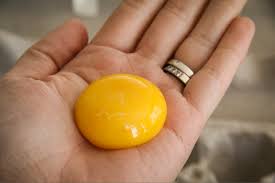The Effect of Time
 North East chef and Egg Award entrant David Tanner gives an interesting insight into why fresh local eggs are better to use than the commercial version.
North East chef and Egg Award entrant David Tanner gives an interesting insight into why fresh local eggs are better to use than the commercial version.
 As with any other ingredient used by chefs, freshness is one of the most important factors contributing to the overall quality of the finished dish. But what effect does freshness have on the overall quality of an egg and why is it so important? In very simple terms and egg is made up of a shell, yolk and albumen (white). Yet, an egg is far from being that simple.
As with any other ingredient used by chefs, freshness is one of the most important factors contributing to the overall quality of the finished dish. But what effect does freshness have on the overall quality of an egg and why is it so important? In very simple terms and egg is made up of a shell, yolk and albumen (white). Yet, an egg is far from being that simple.
The shell contains on average 9,000 pores, and is 95% calcium carbonate, the other 5% being a mix of other minerals including soluble and insoluble proteins. The shells of commercial hens eggs are generally white or brown, although they can be coloured from pink to blue and even green.
This is a genetic trait varying from breed to breed. Enclosed by the egg shell is the albumen (white). This contains 90% water, seven proteins, of which ovalbumin is the main protein (54%). The albumen also contains no fat.
It is a well known fact among chefs that a fresher egg has a tighter albumen, beneficial for many things such as poaching, this is because a fresh albumen contains carbon dioxide which diffuses out of the porous shell over time. The loss of this carbon dioxide causes the albumen to become more alkaline and causes the albumen 'thin'.
 The yolk generally makes up one-third an eggs overall weight, which when fertilized becomes the chickens embryo. The yolk also contains all of an eggs fats and cholesterol, and half of it's protein, and around four times the level of calories as the albumen. The colour of the yolk is a direct effect of the hens diet, a diet rich in xanthopylls (yellow and orange plant pigments) will give the yolk a 'golden colour'.
The yolk generally makes up one-third an eggs overall weight, which when fertilized becomes the chickens embryo. The yolk also contains all of an eggs fats and cholesterol, and half of it's protein, and around four times the level of calories as the albumen. The colour of the yolk is a direct effect of the hens diet, a diet rich in xanthopylls (yellow and orange plant pigments) will give the yolk a 'golden colour'.
 The freshness of an egg can also be determined by the yolk, as a fresh egg will have a firm, round yolk with a tight vitelline membrane. As the egg looses it's freshness the yolk will absorb some of the water from the albumen, causing the vitelline membrane to loose it's tightness and the yolk to become flatter in appearance.
The freshness of an egg can also be determined by the yolk, as a fresh egg will have a firm, round yolk with a tight vitelline membrane. As the egg looses it's freshness the yolk will absorb some of the water from the albumen, causing the vitelline membrane to loose it's tightness and the yolk to become flatter in appearance.
 North East chef and Egg Award entrant David Tanner gives an interesting insight into why fresh local eggs are better to use than the commercial version.
North East chef and Egg Award entrant David Tanner gives an interesting insight into why fresh local eggs are better to use than the commercial version.
What does he have to say about letting eggs sit around at room temperature, as opposed to refrigeration?
ReplyDeleteI would refer you to an earlier blog post ;o)http://theeggaward2013.blogspot.co.uk/2013/03/stuff-about-eggs.html
ReplyDelete